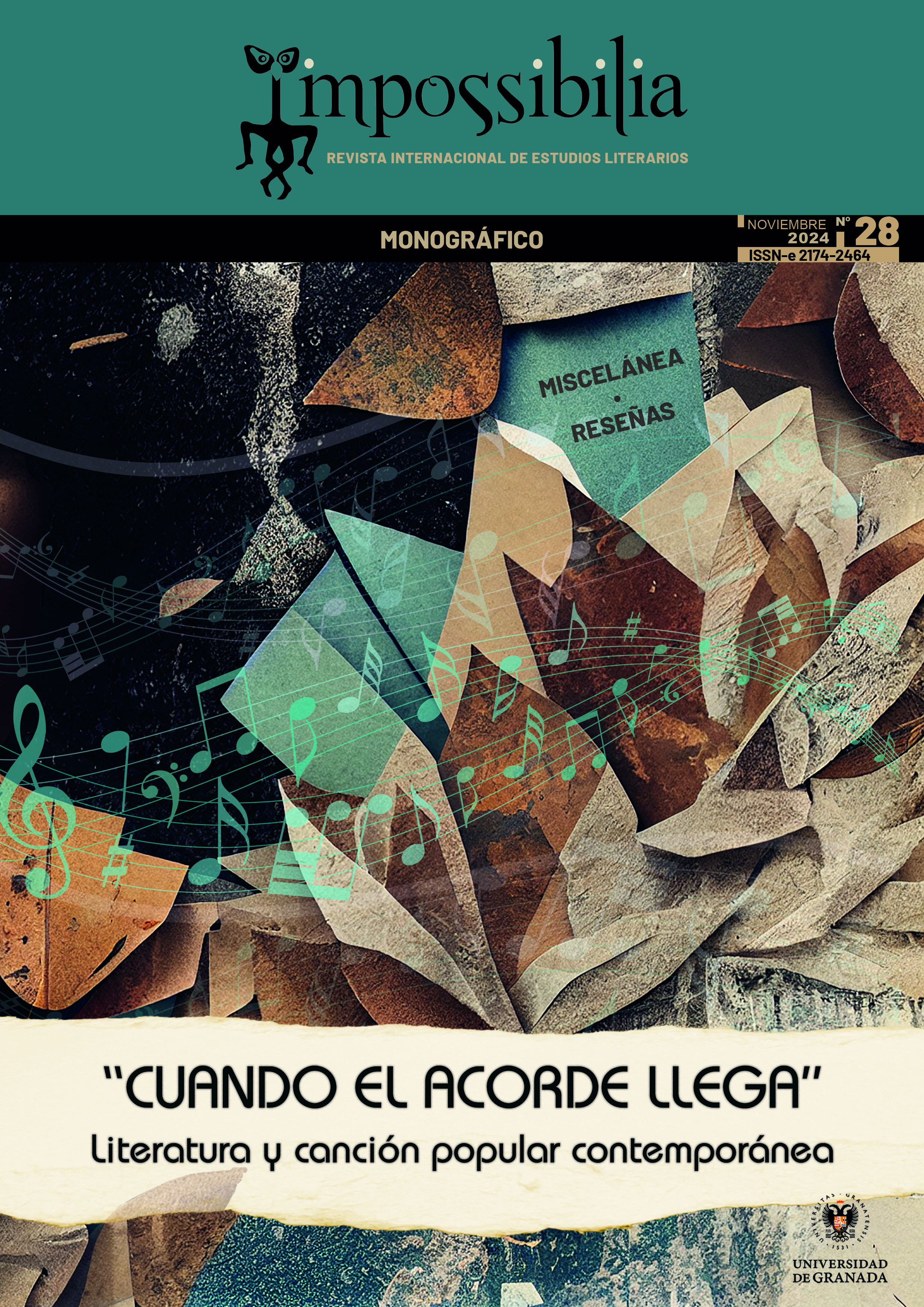Rubén Blades's salsa as an expression of Martí's Modernism
DOI:
https://doi.org/10.30827/impossibilia.282024.30683Keywords:
Salsa, Literature, Music, Rubén Blades, José Martí, ModernismAbstract
One contemporary expression of the cultural Latino identity is salsa music. Since its origins, back in the 1960s, this mix of rhythms has had a good number of outstanding representatives. Rubén Blades, singer and songwriter born in Panamá, has become one of its most successful exponents, partly, thanks to the sociopolitical content of his songs. This research proposes an analogy between Blades’s compositions and Martí’s literary works in the social and political sphere of Latin America. The coincidences that exist between Blades and Martí in terms of ideology, topics, and creativity are established while highlighting the connections between salsa and literature.
Downloads
References
BAKER, Peter. (2017). Modernismo. Disponible en: https://dspace.stir.ac.uk/bitstream/1893/29075/1/Modernismo%202.1.pdf
BATTILANA, Carlos. y CARESANI, Rodrigo. (2019). José Martí: la sensibilidad y el pensamiento de América Latina en Nuestra América: José Martí. César Santa, A (director responsable). Buenos Aires. Biblioteca del Congreso de la Nación, 11-32.
BECERRA MAYORGA, Witton. (2022). El ritmo y la palabra o para una poética de la música salsa. [Versión digital]. Disponible en: https://doi.org/10.19053/9789586606868
BLADES, Rubén. (1978). Plástico [canción]. En Siembra. Fania Records.
BLADES, Rubén. (1980). Maestra vida [canción]. En Maestra vida. Fania Records.
BLADES, Rubén. (1981). Tiburón [canción]. En Canciones del solar de los aburridos. Fania Records.
BLADES, Rubén. (1984). Decisiones [canción]. En Buscando América. Elektra Records.
BLADES, Rubén. (1984). Buscando América [canción]. En Buscando América. Elektra Records.
BLADES, Rubén. (1988). Patria [canción]. En Antecedente. Elektra Records.
BLADES, Rubén. (1992). Adán García [canción]. En Amor y control. CBS.
BORGES, Edgar. (2014). Vínculos. Apuntes con Rubén Blades. Miami. Ígneo Group.
CRUZ, Celia. (1974). Quimbara [canción]. En Celia & Johnny. Fania Records.
GALLUD JARDIEL, Enrique. (2011). José Martí y su teoría poética. Revista De Filología de la Universidad de La Laguna, 73-79.
GUILLÉN, Nicolás. (2000). Canto negro. Disponible en: https://cvc.cervantes.es/literatura/escritores/guillen/poemas/poema_01.htm
MARTÍ, J. (2019 [1891]). Versos sencillos. Disponible en: www.linkgua-digital.com.
MARTÍ, J. (2012 [1891]). Nuestra América. Linkgua.
NATIONAL PUBLIC RADIO (NPR). (2020, 10 de enero). Portrait of: Rubén Blades [podcast]. Disponible en: https://www.npr.org/2020/01/10/795155619/portrait-of-ruben-blades
RAFAEL, Luis. (1999). El Modernismo martiano, nuestro Modernismo. Disponible en: https://www.lehman.cuny.edu/ciberletras/v10/Modernismo1.pdf
RAMA, Ángel. (2015). Martí: modernidad y latinoamericanismo. Biblioteca Ayacucho.
[Versión digital]. Disponible en: https://edisciplinas.usp.br/pluginfile.php/8458904/mod_resource/content/1/Angel%20Rama%20sobre%20Mart%C3%AD%20%28Ayacucho%29.pdf
RAMÍREZ, Sergio. (23 de noviembre de 2021). Una antología recupera la obra de José Martí, el “apóstol americano”. Disponible en https://www.larazon.es/cultura/20211123/ctrvrednl5hlvjxaqjc75xi7yq.html
RAMOS, J., & HERRERA PARDO, H. (2021). Desencuentros de la modernidad en América Latina: literatura y política en el siglo XIX. CLACSO.
ROJAS, Rafael. (8 de junio de 2008). José Martí: un New Yorker en la manigua. Disponible en: https://letraslibres.com/literatura/jose-marti-un-new-yorker-en-la-manigua/
ROLLING STONE. (23 de junio de 2023). The Many Lives of Rubén Blades: From Salsa Legend to ‘Fear the Walking Dead’s’ Ruthless Zombie Killer. Disponible en https://www.rollingstone.com/music/music-latin/ruben-blades-walking-dead-politics-salsa-interview-1234688580/
ROMERO, Alberto Carlos. (2014). Alegorías contemporáneas. Calle 14: Revista de Investigación en el Campo del Arte. 8(12), 122-132. https://revistas.udistrital.edu.co/index.php/c14/article/view/5769
RONDÓN, César Miguel. (1980). El libro de la salsa. [Versión digital]. Disponible en: https://archive.org/details/ellibrodelasalsa01rond/page/n19/mode/2up
RUBIO, José; ROSALES, José; y TOSCANO, Manuel (2009). Democracia, ciudadanía y educación. Madrid. Ediciones Akal
SCHULMAN, Iván (2002). El Proyecto inconcluso: la vigencia del modernismo. México, D.F. Siglo Veintiuno Editores.
SHLYKOVA YANCHINA, Tamara. (2021). Una aproximación al estudio de la obra de Rubén Blades: “el poeta de la salsa”. [Tesis de maestría]. Valencia: Universidad de Valencia. Disponible en: https://roderic.uv.es/rest/api/core/bitstreams/6e5b4792-fd41-4212-8435-47b4322593d4/content
SOSA FUENTES, S. (2011). La identidad cultural latinoamericana en José Martí y Luís Villoro: Estado plural, autonomía y liberación en un mundo globalizado. Revista Mexicana De Ciencias Políticas Y Sociales, 52(208), 41-62.
TABLANTE, L. (2014). El dólar de la salsa: del barrio latino a la industria multinacional de fonogramas, 1971-1999. Vervuert Verlagsgesellschaft. [Versión digital]. Disponible en: https://doi.org/10.31819/9783954878062
Published
How to Cite
Issue
Section
License
Copyright (c) 2024 Impossibilia. Revista Internacional de Estudios Literarios

This work is licensed under a Creative Commons Attribution-NonCommercial-NoDerivatives 4.0 International License.

You are free to share, copy and redistribute the material in any medium or format under the following terms: You must give appropriate credit, you may not use the material for commercial purposes and No Derivatives. Commits to respecting third party intellectual property rights.
Reception and proccesing of papers has no costs for authors.
Author assumes responsibility for the ideas contained in the article.
Papers must be original and must not have been published before and at the moment they are submitted, papers should not be in the process of evaluation by any other electronic or printed media.
The authors are allowed and recommended to publish their published work through the internet. It could produced interesting exchanges and increase the published work citation. (See El efecto del acceso abierto).




















